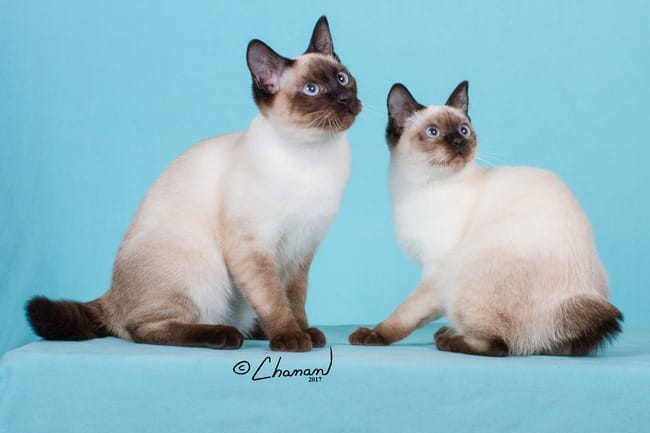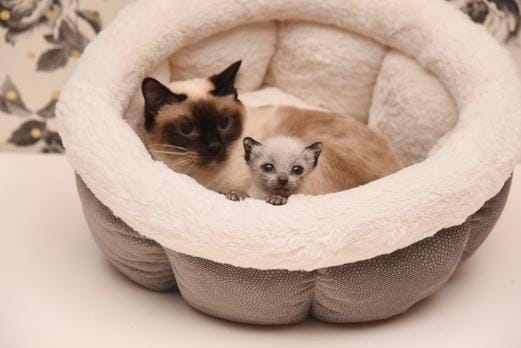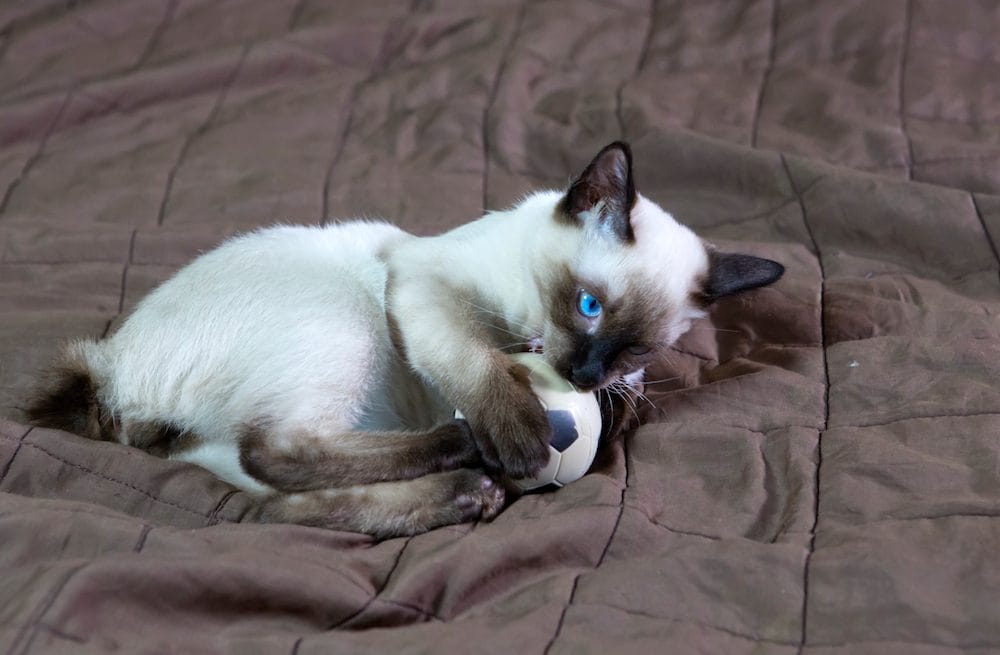The Toybob cat is a naturally occurring breed that originated from a spontaneous genetic mutation. These cats are distinguished by their unique appearance, which includes a distinctive short, kinked tail and a compact, muscular body. In just a few sentences, the Toybob has established itself as a beloved pet due to its endearing personality and adaptability to various living environments.
Introduction The Toybob Cat Breed
The Toybob cat breed traces its roots back to the 1960s, when a chance genetic mutation resulted in the birth of a litter of kittens with short, kinked tails. These unique felines caught the attention of breeders, who recognized their potential as a new breed. Through careful selection and breeding programs, the Toybob cat was officially established and recognized by major cat registries in the early 2000s.

Affectionate with Family ⭐️⭐️⭐️⭐️
Amount of Shedding ⭐️⭐️
General Health ⭐️⭐️⭐️⭐️
Potential for Playfulness ⭐️⭐️⭐️⭐️⭐️
Tendency to Vocalize ⭐️⭐️⭐️
Kid-Friendly ⭐️⭐️⭐️⭐️
Friendly Toward Strangers ⭐️⭐️⭐️
Easy to Groom ⭐️⭐️⭐️⭐️
Intelligence ⭐️⭐️⭐️⭐️
Pet Friendly ⭐️⭐️⭐️⭐️
- Appearance: The Toybob cat is a compact, muscular feline with a unique, short, kinked tail that resembles a toys’ tail, hence the name “Toybob.” They have a rounded, apple-shaped head, large, expressive eyes, and a broad, sturdy body. Their coats can be short or long and come in a variety of colors and patterns.
- Characteristics: These cats are known for their affectionate, people-oriented personalities and their high intelligence. They form strong bonds with their owners and thrive on human companionship. Toybobs are also known for their playful and energetic nature, making them excellent companions for active families.
- Popularity: While still relatively rare, the Toybob cat breed has gained popularity in recent years, particularly among cat fanciers who appreciate its unique appearance and engaging personality.
- Temperament: Toybobs are known for their outgoing and friendly dispositions. They are affectionate with their families and generally adaptable to various living situations, making them suitable for both apartment and house living.
- Lifespan: The Toybob cat breed has an average lifespan of 12 to 15 years with proper care and a healthy lifestyle.
- Coat color: Toybobs come in a wide range of coat colors and patterns, including solid colors, tabby patterns, and bicolor variations.
Is the Toybob cat a mixed breed or an original breed? The Toybob is considered an original breed that developed from a natural genetic mutation. While it shares some physical similarities with breeds like the American Bobtail, Japanese Bobtail, and Pixie-Bob, it is not a direct mix of these breeds.
How to take care of a Toybob cat
Food:
- High-quality, protein-rich cat food is essential for the Toybob’s muscular build and active lifestyle, helping to maintain their strength and energy levels.
- Wet or canned food can help supplement the Toybob’s diet with additional moisture, which is crucial for their overall health and hydration.
- Occasional treats, such as cooked chicken or fish, can be offered in moderation as a reward or for training purposes, but should not make up a significant portion of their diet.
Environment:
- Toybobs thrive in a stimulating environment with plenty of toys, scratching posts, and vertical spaces for climbing and exploring, as they are active and playful cats.
- Access to a secure outdoor enclosure or supervised outdoor time can provide valuable mental and physical stimulation for these energetic felines.
- Providing hiding spots and perches can cater to the Toybob’s natural inclination for observing their surroundings and satisfying their curiosity.
Grooming:
- Regular brushing, especially during shedding seasons, can help manage the Toybob’s coat and reduce excess hair around the home.
- Trimming the nails regularly is recommended to prevent accidental scratches and maintain healthy paw pads.
- Dental care, including regular teeth brushing or providing dental treats, can help maintain good oral hygiene and prevent dental issues.

Care method: Toybobs thrive on companionship and interactive playtime. Engaging them in puzzle feeders, clicker training, or playtime with interactive toys can help satisfy their intellectual and physical needs, creating a strong bond between you and your feline friend.
How to buy/adopt a Toybob cat
- Locations of Toybob cat’s popularity: The Toybob cat breed is most popular in North America, particularly in the United States and Canada, where it originated. However, it has gained a following in other parts of the world, including Europe and Asia.
- Average price for a Toybob cat: The average price for a Toybob kitten from a reputable breeder can range from $800 to $1,500, depending on factors such as pedigree, color, and location.
- Community for Toybob cat adoption/rescue: United Kingdom: Cats Protection, The Governing Council of the Cat Fancy (GCCF) United States: American Bobtail Cat Club, Petfinder, ASPCA Canada: Canadian Bobtail Cat Club, Petfinder Canada, Canadian Federation of Humane Societies
- What to check before adopting/buying a Toybob cat: General health: Ensure the kitten appears healthy, active, and free of any visible signs of illness or congenital defects. Vaccination status: Inquire about the kitten’s vaccination history and schedule to ensure they are up-to-date on essential vaccinations. Medical history: Request documentation of the kitten’s medical history, including any previous treatments or health concerns, to make an informed decision.
How to prepare for a Toybob cat’s life
- Good preparation is key to providing a happy and healthy life for your Toybob cat.
- Ensure a balanced diet, a stimulating environment, and regular veterinary check-ups.
- Be prepared for their energetic and playful nature by providing ample toys and playtime.
- How to take care of a Toybob cat: Prepare a high-quality, protein-rich diet suitable for their age and activity level. Create a stimulating environment with scratching posts, cat trees, and interactive toys. Provide regular grooming, including brushing, nail trimming, and dental care. Socialize and train your Toybob cat from an early age to foster a well-rounded personality. Establish a consistent routine for feeding, playtime, and litter box maintenance.
- Essential equipment for caring for a Toybob cat: Food and water bowls Litter box and litter Scratching posts and cat trees Interactive toys and puzzle feeders Grooming tools (brush, nail trimmer, etc.) Carrier for safe transportation
- Common diseases in Toybob cats: Obesity (due to their tendency for overeating and a sedentary lifestyle) Dental issues (regular dental care is crucial) Skin allergies (monitor for signs of itching or excessive grooming) Prevention: Regular exercise, a balanced diet, and routine veterinary check-ups can help prevent these conditions.
- Necessary vaccines for Toybob cats: Feline distemper (panleukopenia) Feline calicivirus Feline herpesvirus type 1 (rhinotracheitis) Rabies (as required by local laws) Consult with your veterinarian for the appropriate vaccination schedule.

Common names for Toybob cats
When naming your Toybob cat, consider their unique appearance, playful nature, or even their historical origins. Some popular name options include:
- Bob, Bobbie, Bobkin, Bobbi
- Toy, Toya, Toyo, Toytoy
- Pixie, Sprite, Munchkin, Stumpy
- Gizmo, Ziggy, Zazu, Ziggy
“Do Toybob cats like going out rather than staying home?”
Toybobs are generally adaptable and can thrive in both indoor and outdoor environments, but they require supervision or a secure enclosure when outdoors.
“Is a Toybob cat a smart cat?”
Yes, Toybob cats are known for their high intelligence and are often described as quick learners and problem-solvers.
“How many types of Toybob cats are there?”
There is only one recognized breed of Toybob cat, although they can come in various coat colors and patterns.
“How do I stop my Toybob cat from biting?”
Provide plenty of interactive playtime and redirect their biting behavior to appropriate toys. Consult a veterinarian or trainer for advice on addressing any persistent biting issues.
“How do I stop my Toybob cat from scratching?”
Provide ample scratching posts and trim their nails regularly. Positive reinforcement training can also help discourage scratching of furniture or other inappropriate surfaces.
“How do I socialize and raise a friendly Toybob cat?”
Early socialization and positive reinforcement training from a young age can help foster a well-rounded and friendly Toybob cat.
“How do I train my cat?”
Toybobs are highly intelligent and respond well to positive reinforcement training methods, such as clicker training or treat-based rewards.
“How often should I have my Toybob cat’s health checked by a veterinarian?”
Regular annual check-ups and preventative care are recommended for monitoring your Toybob cat’s overall health and addressing any potential concerns.
“Are Toybob cats good family pets?”
With their affectionate and people-oriented personalities, Toybobs can make excellent family pets, particularly in households with children who are taught to interact respectfully with pets.
“Are Toybob cats good with children?”
Toybobs are generally tolerant and gentle with children when properly introduced and supervised. However, it’s essential to teach children how to interact appropriately with pets.
“Are Toybob cats good with other animals?”
With proper socialization and introductions, Toybobs can coexist with other pets in the household, including dogs and cats.
“Can Toybob cats cause allergies?”
Like any other cat breed, Toybobs can potentially trigger allergies in some individuals due to their dander and saliva. However, their moderate shedding may make them a better option for some allergy sufferers.
“Are Toybob cats ferocious?”
No, Toybobs are generally known for their friendly and outgoing dispositions. However, like any pet, they should be treated with respect and properly socialized to prevent any potential aggression or fear-based behaviors.
“Do Toybob cats have significant hair loss problems?”
While Toybobs do shed, they are not considered heavy shedders. Regular grooming can help manage their shedding and maintain a healthy coat.
Captivated by their independent spirit and mesmerizing eyes, cats have become cherished companions in countless homes. Whether you’re a seasoned cat owner or a curious newcomer, unraveling the world of felines can be both fascinating and rewarding. Our website delves into the captivating realm of cats, offering a treasure trove of information on all things feline. Explore a diverse array of cat breeds, each boasting unique personalities and appearances.
Discover essential tips on cat training, cat care ensuring your furry friend thrives with proper cat diet nutrition & cat food and attentive healthcare. Learn about common feline diseases and preventive measures to keep your cat healthy and happy. Dive deeper into the fascinating world of cats and embark on a journey of purrs and companionship. Visit our website today and unlock a wealth of knowledge about cat health problems captivating creatures!

